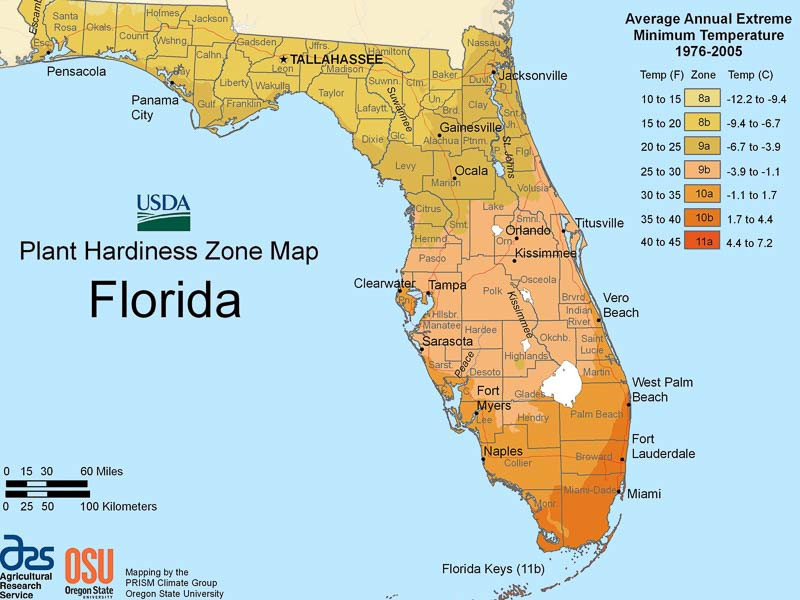About 25 percent of the plant species native to North America are at risk of extinction. You can help reverse this trend by planting great native plants in your garden.
Florida is divided into four main ecological regions: the East Gulf Coastal Plain, the South Atlantic Coastal Plain, Florida Peninsula, and Tropical Florida. Unique in topography, soil depth, pH, elevation, light, and hydrology, each region provides a rich variety of ecological habitats, supporting many native plant species.
Noted for its mild climate, with temperatures typically ranging between 23-95ºF and relatively high rainfall, averaging 65 inches per year, the Florida Peninsula or Central Florida is located in USDA zones 9a and 9b.
Extending 300 miles southward from the mainland, Central Florida begins in the temperate southeast and ends in the subtropical Everglades and the Florida Keys.
A large portion of the landscape supports herbaceous and forested wetlands. Upland areas include hardwood forests. It is estimated that two-thirds of Florida’s 7,800 lakes occur in the Florida Peninsula Ecoregion.

Florida supports the fourth highest biodiversity in the United States and ranks third in the number of species listed as threatened or endangered by the U.S. Fish and Wildlife Service.
According to the U.S. Forest Service, Invasive species have contributed to the decline of 42% of U.S. endangered and threatened species, and 18% of U.S. endangered or threatened species. Invasive species compete directly with native species for moisture, sunlight, nutrients, and space. They displace and alter native plant communities, degrade wildlife habitat and water quality, and potentially lead to increased soil erosion.
The federal government has estimated that nearly 25 percent of the 20,000 plant species native to North America are at risk of extinction, many of these through habitat loss. You can help reverse this trend by planting great native plants in your garden.
A plant is considered native if it has occurred naturally in a particular region or ecosystem without human introduction. There are many benefits to growing native plants.
Here is a list of Central Florida native trees that are well-suited for plantings in shady gardens.
| Hardiness |
9 |
|---|---|
| Plant Type | Trees |
| Exposure | Partial Sun, Shade |
| Native Plants | United States, Southeast, Florida |
High Mountain, Shutterstock
| Hardiness |
9 |
|---|---|
| Plant Type | Trees |
| Exposure | Partial Sun, Shade |
| Native Plants | United States, Southeast, Florida |
Create a membership account to save your garden designs and to view them on any device.
Becoming a contributing member of Gardenia is easy and can be done in just a few minutes. If you provide us with your name, email address and the payment of a modest $25 annual membership fee, you will become a full member, enabling you to design and save up to 25 of your garden design ideas.
Join now and start creating your dream garden!
Create a membership account to save your garden designs and to view them on any device.
Becoming a contributing member of Gardenia is easy and can be done in just a few minutes. If you provide us with your name, email address and the payment of a modest $25 annual membership fee, you will become a full member, enabling you to design and save up to 25 of your garden design ideas.
Join now and start creating your dream garden!